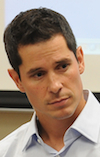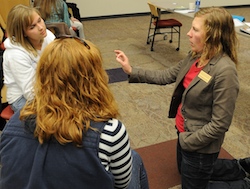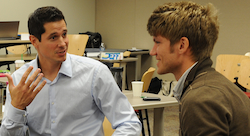AMES, Iowa -- When Howard Tyler joined the faculty at Iowa State University 20 years ago, he felt well prepared for most aspects of his job. But the first time a student in the throes of an emotional crisis walked into his office, he knew he had a lot to learn.
With no formal training on how to respond to mental health issues, Tyler resorted to trial and error, steering the student to find help as best he could. Sometimes it worked, sometimes it didn't. Early in his faculty career, a student committed suicide.
That's why Tyler -- now an associate professor of animal science and biomedical engineering -- was among the first to sign up for the ISU Student Counseling Service's (SCS) new Mental Health First-Aid training. The 12-hour session teaches faculty and staff a set of action steps for helping a distressed student until appropriate treatment and support are received.
"Many students just need someone to notice they are having challenges and ask about their life in a nonjudgmental way," said Tyler, who completed the training in July.
"The training gives you the tools to initiate these conversations, recognize the issues and effectively refer students to the appropriate resources," he said. "I'm confident that I can handle new situations without resorting to the trial-and-error approach that was my staple in the past."
Need for services on the rise nationally
Although SCS primarily provides mental health and career counseling services for students, the unit also offers consultation support for faculty and staff, says SCS Director Terry Mason.
"Faculty and staff are out there on the frontlines," Mason said. "And they often have questions for us about something they see in a student, wanting to know if they have a reason to be concerned."
There probably is reason for concern. According to Mason, college and university counseling services throughout the country are seeing students with increasingly severe mental health issues, for example - more serious cases of anxiety, depression, and eating disorders as well a students with extensive abuse and trauma histories.
"We're part of a national trend. Over the past four years, we've seen a 25 percent increase in attended appointments. Last year, we provided more than 10,000 sessions," Mason said.
"An increase in numbers is actually a good sign. It means students are dealing with these issues and trying to get help," he added.
Building mental health literacy among faculty and staff
For some time, Mason and his staff of 12 counselors have recognized the "incredible need" to support faculty and staff in a preventive way, enabling them to recognize when mental health is at the root of an issue a student is experiencing, understand how to approach that person and how to make a referral.
"We don't want faculty and staff out there counseling," Mason said. "But we do want them to feel comfortable in knowing what resources are available and in referring students there to get help."
SCS staff identified an international program from Australia that teaches and certifies people to train others in mental health first aid. Designed by a nurse and a professor, the program is available in 17 countries.
"It's a parallel with medical first aid -- being the first responder, not the professional," Mason explained. "You're not going to do a tracheotomy when someone stops breathing, but you want to keep that person going until medics can handle it."
Faculty and staff "are hungry for this"
Three Iowa State staff members - Jeffrey K. Ellens and Erin Pederson, both SCS licensed psychologists, and Sally Deters, residence life coordinator for the university's residence halls - completed the five-day, 32-hour course for certification as mental health first-aid trainers. Good for three years, the certification requires instructors to conduct three trainings per calendar year.
 Ellens
Ellens
Ellens, Pederson and Deters have offered three trainings in the past six months, building a cadre of 83 trained first responders who can guide a student in crisis. SCS first offered the program to groups most likely to deal directly with student behavioral issues - residence hall directors, Thielen Student Health Center doctors and nurses, dean of students staff, advisers and faculty. SCS intends to offer more sessions as resources become available, Mason said.
 Fine tuning a role
play exercise.
Fine tuning a role
play exercise.
Feeling empowered to respond
The training is a "set, organized, systematic program," Pederson said.
The instructors present a five-step response plan called
ALGEE:
A -- Assess for risk of suicide or harm
L -- Listen nonjudgmentally
G -- Give reassurance and information
E -- Encourage appropriate professional help
E -- Encourage self-help and other support strategies
During a training, Pederson and Ellens establish a "safety zone" in which participants can discuss openly and confidentially, make mistakes and take risks. The instructors use role playing, brainstorming and repeated practice of the ALGEE steps.
 Ellens with Jerrit
Tucker, psychology graduate assistant, during training.
Ellens with Jerrit
Tucker, psychology graduate assistant, during training.
"We throw a lot at them," Ellens said. "But there's already a lot of knowledge within these groups. So we draw from and reflect on their experience. The critical part is building confidence so they feel empowered."
Pederson said they help participants destigmatize mental health issues and provide background on conditions ranging from depression and anxiety to self-injury and psychosis.
 Pederson
Pederson
"The reality is that 26.2 percent of the U.S. population this year alone will suffer from a diagnosable mental health condition -- such as anxiety, depression, eating disorders, substance abuse or dependence and schizophrenia," Pederson said. "And the lifetime prevalence is twice that. Mental health problems are common. Almost half of us will have a mental illness within our lifetimes."
Being calm, centered and caring
Participants also learn new ways to respond to students in distress.
"We don't want people to go into the old patterns," Ellens said. "For example, most of us just naturally want to make it go away. But the person in distress sees this whole fixing-it-in-the-moment approach as minimizing or belittling their problem. So we give participants positive ways to respond to those in distress."
And they learn how to deliver messages with "great compassion and caring," Ellens added.
"They go away from the training feeling shifted in some way on an emotional level and are able to deliver messages with a different kind of care," Ellens said. "That's even noticeable to Erin and me from day one to day three of the training. How they role play changes -- they are more calm, centered and caring. It's nice feedback to watch unfold."
Pederson added that she also feels enriched by her interactions with the participants.
"Hearing examples of their interactions with students has made me feel proud -- this staff person reached out to help a student in a caring way, and sometimes went out of their way to do it," Pederson said.
"They're doing it so they can be more effective for Iowa State students."